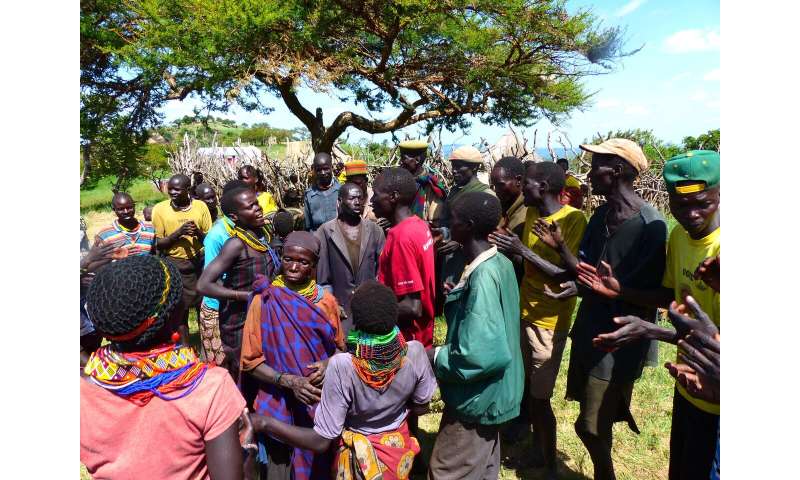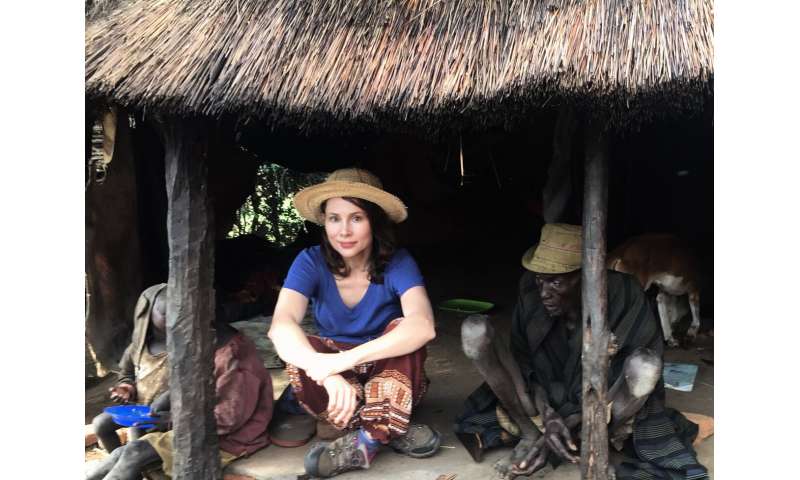#’Selfish and loveless’ society in Uganda really is not
“#’Selfish and loveless’ society in Uganda really is not”

A mountain people in Uganda—branded as selfish and loveless by an anthropologist half a century ago—really is not, according to a study led by a Baylor University anthropologist.
The research debunks the assessment of the Ik ethnic group of hunter-gatherers set out in the book “The Mountain People,” published by Colin Turnbull in 1972.
Baylor anthropologist Cathryn Townsend, Ph.D., formerly of Rutgers University, lived with and gathered data from the Ik in 2016 to 2018. She found that Turnbull’s research, done during a severe famine in the mid-1960s, did not uncover typical behavior of the Ik, and that sharing and cooperating re-emerged once resources were plentiful enough.
“The Ik have been misrepresented by outsiders who gave far too much credence to Turnbull’s flawed research,” Townsend said. “The Ik people have not yet themselves had much of a chance to talk back to correct this misrepresentation of their culture, but our research shows that associating the Ik with selfishness is a myth and that it is simply wrong.
“Ik culture includes traits that encourage sharing with those in need and a belief in supernatural punishment of selfishness,” she said. “The findings confirm the consensus among scholars that humans are remarkably cooperative.”
The study, published in the journal Evolutionary Human Sciences, was conducted with co-researchers from Arizona State University, Vrige Universiteit in Amsterdam and Rutgers University.
Turnbull did his fieldwork between 1964 and 1967, going so far as to advocate that the group be rounded up forcibly regardless of age and gender and taken to remote parts of Uganda to stamp out culture traits. His depiction of the Ik attracted attention from such publications as TIME Magazine and The New York Times, inspired a play by Royal Shakespeare Company and was accepted by anthropologist Margaret Mead.
The Ik, who live in villages ranging from 50 to 250 people, believe that the landscape is inhabited by spirits with shadowy human forms. Their religion also incorporates Christianity and the idea of a creator or supreme god. They believe nature spirits bring misfortune to those who fail to share and reward those who are generous.
In the study, Townsend used an instrument commonly used in the human sciences to assess generosity. It includes a theoretical framework in which a person receives money and the opportunity to share some, none or all with an anonymous person in their community.

About 120 Ik individuals were divided into four groups and asked whether they would be willing to share a typical day’s wages of 2,000 Ugandan shillings (equal to about 50 cents in the United States).
The scenarios, with varying details about needs and religious beliefs, included:
- You will be given 2,000 shillings to decide how to share between yourself and another member of your community. You will not find out who this person is, and they will not find out who you are.
- You will be given 2,000 shillings to decide how to share between yourself and another member of your community who is in need. For example, that person may be old and hungry. You will not find out who this person is, and they will not find out who you are.
- What do you know of Earth spirits? Do they cause trouble for people who do not share? Do they bring good fortune to those who do? You will be given 2,000 shillings to decide how to share between yourself and another community member. You will not find out who this person is, and they will not find out who you are.
- What do you know of Earth spirits? Do they cause trouble for people who do not share? Do they bring good fortune to those who do? You will be given 2,000 shillings to decide how to share between yourself and a community member in need. For example, that person may be old and hungry. You will not find out who this person is, and they will not find out who you are
.
Results showed participants were most likely to be more generous in the scenario that included both a needy recipient and supernatural punishment, as compared with the first scenario. The responses in Scenarios 2 and 3 also were more generous.
“People behaved, on average, very slightly more generously in Scenario 3—which referred to supernatural punishment—than they did in Scenario 2, but the difference is negligible,” Townsend said.
In the study, Townsend also observed the people’s day-to-day sharing and asked what sharing meant to them. Sharing is based on need and ties of friendship, kinship or clan, but interviewees also talked about the importance of cultivating sharing. Said one man: “If you keep everything in your granary to yourself, you will still run out of food during the hunger season, and then you will suffer because no one will share with you.”
In one case, the Ik even accepted a widow and infant who were refugees from a nearby and often hostile group.
In Townsend’s interviews with 60 respondents, more than three fourths said Earth spirits caused trouble for people who do not share; nearly half said the spirits bring good fortune to those who do.
In a second analysis, researchers compared the Ik’s sharing with generosity assessments of more than 20,000 participants, mostly in Western countries. They found the people’s behavior similar to that of other societies.
“While the selfish behavior observed by Turnbull may have been at least partly real, we can conclude that this was due to a severe famine at the time in which people were starving to death, not culture,” Townsend said. “The Ik people have experienced many extreme hardships since the famine that Turnbull witnessed in the 1960s, but the resilience of Ik culture traits of generosity should give us all hope that human cooperation ultimately overcomes adversity.”
More information:
Cathryn Townsend et al, Generosity among the Ik of Uganda, Evolutionary Human Sciences (2020). DOI: 10.1017/ehs.2020.22
‘Selfish and loveless’ society in Uganda really is not (2020, July 27)
retrieved 27 July 2020
from https://phys.org/news/2020-07-selfish-loveless-society-uganda.html
This document is subject to copyright. Apart from any fair dealing for the purpose of private study or research, no
part may be reproduced without the written permission. The content is provided for information purposes only.
If you want to read more Like this articles, you can visit our Science category.
if you want to watch Movies or Tv Shows go to Dizi.BuradaBiliyorum.Com for forums sites go to Forum.BuradaBiliyorum.Com


